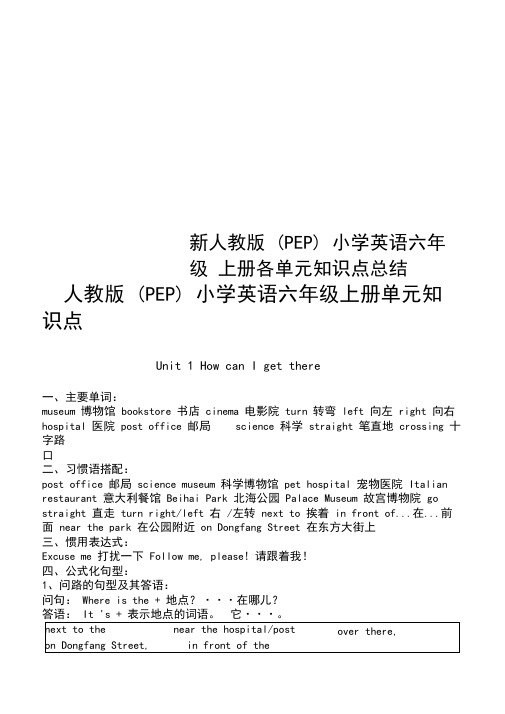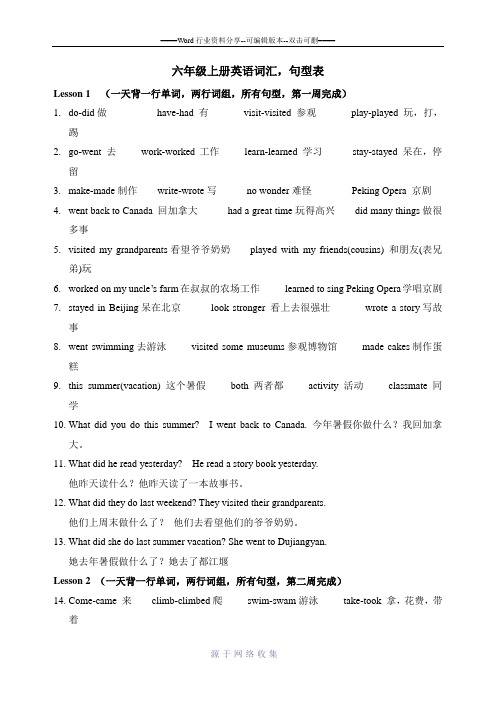六年级上册各单元词组与句型(英文)
- 格式:doc
- 大小:63.50 KB
- 文档页数:9

人教版六年级英语上册各单元知识点汇总Unit 1 How do you go to school?一、重点短语:by plane 坐飞机by ship 坐轮船on foot步行by bike 骑自行车by bus 坐公共汽车by train 坐火车traffic lights 交通灯traffic rules交通规则go to school 去上学get to 到达get on上车get off下车Stop at a red light. 红灯停Wait at a yellow light. 黄灯等Go at a green light. 绿灯行二、重点句型:1.How do you go to school?你怎么去上学?ually I go to school on foot. Sometimes I go by bus.通常我步行去上学。
有时候骑自行车去。
3.How can I get to Zhongshan Park ?我怎么到达中山公园?4.You can go by the No. 15 bus. 你可以坐15路公共汽车去。
三、重点语法:1、There are many ways to go somewhere.到一个地方去有许多方法。
这里的ways一定要用复数。
因为there are是There be句型的复数形式。
2、on foot 步行乘坐其他交通工具大都可以用介词by…,但是步行只能用介词on 。
4、go to school的前面绝对不能加the,这里是固定搭配。
5、USA 和US 都是美国的意思。
另外America也是美国的意思。
6、go to the park 前面一定要加the. 如果要去的地方有具体的名字,就不能再加the ,如果要去的地方没有具体名字,都要在前面加the. (go to school除外。
)7、How do you go to …?你怎样到达某个地方?如果要问的是第三人称单数,则要用:How doeshe/she…go to …?8、反义词:get on(上车)---get off(下车)near(近的)—far(远的)fast(快的)—slow(慢的)because(因为)—why(为什么)same(相同的)—different(不同的)9、近义词:see you---goodbye sure---certainly---of course10、频度副词:always 总是,一直usually 通常often经常sometimes 有时候never 从来不Unit 2 Where is the science museum?一、重点短语:library 图书馆post office 邮局hospital医院cinema 电影院bookstore书店science museum科学博物馆turn left向左转turn right 向右转go straight 直行north北south南east东west西next to靠近、与……。

新人教版 (PEP) 小学英语六年级上册各单元知识点总结人教版(PEP) 小学英语六年级上册单元知识点Unit 1 How can I get there一、主要单词:museum 博物馆bookstore 书店cinema 电影院turn 转弯left 向左right 向右hospital 医院post office 邮局science 科学straight 笔直地crossing 十字路口二、习惯语搭配:post office 邮局science museum 科学博物馆pet hospital 宠物医院Italian restaurant 意大利餐馆Beihai Park 北海公园Palace Museum 故宫博物院go straight 直走turn right/left 右/左转next to 挨着in front of...在...前面near the park 在公园附近on Dongfang Street 在东方大街上三、惯用表达式:Excuse me 打扰一下Follow me, please! 请跟着我!四、公式化句型:1、问路的句型及其答语:问句:Where is the + 地点?···在哪儿?答语:It 's + 表示地点的词语。
它···。
2、询问怎么到某地的句型及其答语:问句:How can +主语+ get (to)+地点?···怎么到···?同义句型:Can you tell me the way to + 地点?Where is + 地点?Which is the way to + 地点?答语:Turn +方向+表示地点的介词短语。
···转。
at the cinema at the corner near the post office...五、例句:Where is the cinema, please? 请问电影院在哪里?It ' s next to the hospital. 它与医院相邻。

六年级上册英语词汇,句型表Lesson 1 (一天背一行单词,两行词组,所有句型,第一周完成)1.do-did做have-had 有visit-visited 参观play-played 玩,打,踢2.go-went 去work-worked工作learn-learned 学习stay-stayed 呆在,停留3.make-made制作write-wrote写no wonder难怪Peking Opera 京剧4.went back to Canada 回加拿大had a great time玩得高兴did many things做很多事5.visited my grandparents看望爷爷奶奶played with my friends(cousins) 和朋友(表兄弟)玩6.worked on my uncle’s farm在叔叔的农场工作learned to sing Peking Opera学唱京剧7.stayed in Beijing呆在北京look stronger 看上去很强壮wrote a story写故事8.went swimming去游泳visited some museums参观博物馆made cakes制作蛋糕9.this summer(vacation) 这个暑假both 两者都activity活动classmate同学10.What did you do this summer? I went back to Canada. 今年暑假你做什么?我回加拿大。
11.What did he read yesterday? He read a story book yesterday.他昨天读什么?他昨天读了一本故事书。
12.What did they do last weekend? They visited their grandparents.他们上周末做什么了?他们去看望他们的爷爷奶奶。

一般现在时用法1.表示事物或人物的特征、状态。
如:The sky is blue.天空是蓝色的。
2.表示经常性或习惯性的动作。
如:I get up at six every day.我每天六点起床。
3.表示客观现实。
如:The earth goes around the sun.地球绕着太阳转。
结构:1.be动词:主语+be(am,is,are)+其它。
如:I am a boy.我是一个男孩。
2.行为动词:主语+行为动词(+其它)。
如:We study English.我们学习英语。
当主语为第三人称单数(he,she,it)时,要在动词后加“-s”或“-es”。
如:Mary likes Chinese.玛丽喜欢汉语。
否定句,一般疑问句,特殊疑问句变化1.be动词的变化。
(1)否定句:主语+be+not+其它。
如:He is not a worker.他不是工人。
(2)一般疑问句:Be+主语+其它?如:—Are you a student?—Yes.I am./No,I’m not.(3)特殊疑问句:疑问词+一般疑问句?如:Where is my book?2.行为动词的变化。
(1)否定句:主语+don’t(doesn’t)+动词原形+其它。
如:I don’t like milk.当主语为第三人称单数时,要用doesn’t构成否定句。
如:He doesn’t often play football.(2)一般疑问句:Do(Does)+主语+动词原形+其它?如:—Do you often play the piano?—Yes,I do./No,I don’t.当主语为第三人称单数时,要用does构成一般疑问句。
如:—Does she go to work by bike?—Yes,she does./No,she doesn’t.(3)特殊疑问句:疑问词+一般疑问句?如:How does your mother go to work?一般过去时一、一般过去时的概念一般过去时表示过去某个时间发生的动作或状态。

六年级上册一到三单元英语笔记Unit 1 How can I get there?一、重点单词。
1. science museum(科学博物馆)- “science”是“科学”的意思,例如:Science helps us understand the world better.(科学帮助我们更好地理解世界。
)- “museum”是“博物馆”,可数名词。
2. post office(邮局)- “post”有“邮政、邮寄”的意思,“office”是“办公室”,合起来就是办理邮政业务的地方。
3. bookstore(书店)- 由“book(书)”和“store(商店)”组成。
4. cinema(电影院)- 去电影院看电影可以说“go to the cinema”。
5. hospital(医院)- 如果说“in the hospital”,表示在医院里(不一定是生病住院,可能是看望病人或者在医院工作等);“in hospital”则表示生病住院。
6. crossing(十字路口)- 是“cross(穿过)”的名词形式,例如:Turn left at the second crossing.(在第二个十字路口左转。
)7. turn(转弯)- 常见搭配:“turn left(左转)”“turn right(右转)”“turn around (转身)”。
8. left(左边)- 反义词是“right(右边)”,例如:The bookstore is on the left.(书店在左边。
)二、重点短语。
1. near(在……附近)- 例如:My home is near the school.(我的家在学校附近。
)2. next to(紧挨着)- 它比“near”表示的距离更近,如:The library is next to the post office.(图书馆紧挨着邮局。
)3. in front of(在……前面)- 注意与“in the front of”的区别,“in the front of”表示在物体内部的前面,例如:The teacher stands in the front of the classroom.(老师站在教室的前面,是在教室内部);而“in front of”是在物体外部的前面,如:There is a tree in front of the house.(房子前面有一棵树)。

Unit 1 How can I get there?一、重点单词和短语(1)science museum科学博物馆post office邮局bookstore书店cinema电影院hospital医院restaurant餐馆bank银行bus stop公交车站lake湖library图书馆crossing十字路口school学校park公园garden花园hotel旅馆zoo动物园(2)turn left向左转turn right向右转go straight直走near在…附近next to紧挨着/ 与…相邻far from 离…远behind在…后面in front of在…前面between…and…在…和…之间二、按要求写单词hot(反义词)cold cool(反义词)warm too(同音词)to/twosea(同音词)see can not(缩写)can't right(反词)left/wrongbuy(同音词)by/bye first(基数词)one four(序数词)fourthdid (原形)do /does three(序数词)third三、重点句型分析1. Where is the museum shop? 2。
It’s near the park.3。
How can we get there?询问“怎样去某地”Turn left at the bookstore. Then turn right at the hospital。
5。
Is the hospital far from here? Yes, it is。
/ No,it isn't。
Unit 2 Ways to go to school一、重点单词和短语on foot步行by bus =take a bus乘公交车by plane乘飞机by ship乘船by taxi 乘出租车by subway 乘地铁by train乘火车by bike骑自行车slow down 慢下来stop and wait停下来等pay attention to注意cross the road横穿马路traffic light通信号灯at home在家look right向右看look at朝…看play with和…一起玩二、按要求写单词go (反义词)come foot(复数)feet child(复数)childrenearly(反义词)late good(反义词)bad take(反义词)bringslow(反义词)quick/fast go(过去式)went do(过去式)diddo(第三人称单数) does go(第三人称单数)goessame 相同的(反义词)different不同的miss(过去式)missedwrong 错误(反义词)right正确can(否定形式)can’t三、重点句型分析1。
六年级上册英语一到六单元知识总结Unit 1 How can I get there?一、重点单词。
1. 地点名词。
- science museum(科学博物馆),post office(邮局),bookstore(书店),cinema(电影院),hospital(医院),crossing(十字路口),turning(转弯处)等。
2. 方位介词及短语。
- near(在……附近),next to(紧挨着),in front of(在……前面),behind(在……后面),between…and…(在……和……之间)。
3. 动词短语。
- turn left(向左转),turn right(向右转),go straight(直走)。
二、重点句型。
1. - Where is the library?- It's near the post office.2. - How can I get to the hospital?- Turn left at the bookstore. Then go straight.三、语法点。
1. 特殊疑问句的用法:以特殊疑问词(where, how等)开头,用来询问地点、方式等信息。
2. 一般现在时在问路指路中的运用。
Unit 2 Ways to go to school.一、重点单词。
1. 交通工具名词。
- by bike(骑自行车),by bus(乘公共汽车),by train(乘火车),by plane(乘飞机),on foot(步行),ship(轮船),subway(地铁)等。
2. 形容词。
- slow(慢的),fast(快的)。
3. 其他。
- traffic(交通),traffic lights(交通灯),stop(停),wait(等)。
二、重点句型。
1. - How do you come to school?- Usually, I come on foot.2. - How can I get to the Fuxing Hospital?- Take the No. 57 bus over there.三、语法点。
人教版 (PEP)小学英语六年级上册单元知识点Unit 1 How can I get there ?一、主要单词:museum 博物馆bookstore 书店cinema 电影院turn 转弯left 向左right 向右straight 笔hospital 医院post office 邮局science科学直地crossing十字路口二、习惯语搭配:post office 邮局science museum科学博物馆pet hospital 宠物医院Italian restaurant 意大利餐馆Beihai Park北海公园Palace Museum 故宫博物院go straight 直走turn right/left 右 / 左转next to 挨着in front of...在...前面near the park 在公园附近on Dongfang Street 在东方大街上三、惯用表达式:Excuse me 打扰一下Follow me, please!请跟着我!四、公式化句型:1、问路的句型及其答语:问句: Where is the + 地点?···在哪儿?答: It's + 表示地点的。
它···。
next to the bookstore, near the hospital/post office,overthere,on Dongfang Street, in front of the school...2、怎么到某地的句型及其答:1 / 17句: How can +主+ get (to)+地点?···怎么到···?同句型:Can you tell me the way to +地点?Where is + 地点?Which isthe way to +地点?答: Turn +方向 +表示地点的介短。
新起点英语六年级上册Unit 1: In China单词:province 省, [ˈprɔvins]east东, 东方的,向东方的 [i:st]south南, 南的;(风)来自南方的 [sauθ]west西,在西方的;西部的;朝西的 [west]north北,北方的;北部的;朝北的 [nɔ:θ]the Potala Palace布达拉宫, ['pəu ta:la: 'pæləs]the Shaolin Temple少林寺, [ˈtempl]Yellow Mountain黄山, [ˈjeləu] [ˈmauntin]the Stone Forest石林, [stəun][ˈfɔrist]Elephant Trunk Hill象鼻山, [ˈelifənt][trʌŋk][hil] Tibet西藏, [tɪˈbet]Mount Tai泰山,[maunt]snow-capped mountains雪山, [snəu][kæp] [ˈmauntin] the warriors兵马俑, [ˈwɔriə]the Terra-cotta Warriors the Magao Caves莫高窟, [keiv]silk丝绸, [silk]Chinese tea中国茶, [tʃaɪˈni:z, -ˈni:s]Mount Emei 峨嵋山[maunt]句型:1.Where is Harbin? 哈尔滨在哪?It’s in Heilongjiang province.它在黑龙江省.It’s in the north of China.它在中国北部.2.What’s Tibet famous for? 西藏因什么而著名?It’s famous for the Potala Palace.它因布达拉宫而著名. Unit 2: Around the World:单词:continent洲,[ˈkɔntinənt]Asia亚洲, [ˈeɪʃə]Europe欧洲, [ˈjʊərəp]Africa非洲, [ˈæfrikə]North America北美洲,South America南美洲,Oceania大洋洲, [ˌəʊʃi:ˈæni:ə]Russia俄罗斯, [ˈrʌʃə]Egypt埃及, [ˈi:dʒɪpt]Spain西班牙, [speɪn]the United States美国,[ju:ˈnaɪtɪd] [steit]Thailand泰国,[ˈtailænd]Canada加拿大,[ˈkænədə]Japan日本,[dʒəˈpæn]France法国,[fræns]Britain英国,[ˈbrɪtn]Australia澳大利亚, [ɔ:ˈstreɪljə]Japanese日语, [ˌdʒæpəˈni:z, -ˈni:s]Chinese汉语, [tʃaɪˈni:z, -ˈni:s]French法语, [frentʃ]Russian俄语, [ˈrʌʃən]pyramid金字塔, [ˈpirəmid]kangaroo袋鼠[ˌkæŋgəˈru:]句型:1.Where would you like to go this winter vacation?今年寒假你想去哪? I’d like to go to Barcelona.我想去Barcelona.2.What do you know about France?关于法国,你知道什么?It’s in Europe.它在欧洲.What language do people speak there?那里的人们说什么语言?They speak French..他们说法语.Unit 3:Animal World:单词:reptile爬行动物, [ˈreptail]mammal哺乳动物, [ˈmæməl]insect昆虫, [ˈinsekt]crocodile鳄鱼, [ˈkrɔkədail]ostrich鸵鸟,[ˈɔstrɪtʃ, ˈɔ:s-]penguin企鹅, [ˈpeŋɡwin]whale鲸, [hweil]shark鲨, [ʃɑ:k]hippo河马, [ˈhipəu]zebra斑马, [ˈzi:brə]lion狮子, [ˈlaiən]butterfly蝴蝶, [ˈbʌtəflai]hummingbird蜂鸟, [ˈhʌmɪŋˌbɜ:d]centimeter厘米, [ˈsentimi:tər]giraffe长颈鹿, [dʒəˈræf]meter米, [ˈmi:tə]kilometer千米, [ˈkiləˌmi:tə]strong强壮的, [strɒŋ]wing翅膀, [wiŋ]ton吨, [tʌn]heavy重的.[ˈhevi]句型:1.What kind of animal are monkeys? 猴子是哪一类动物?They’re mammals.它们是哺乳动物.2. How tall is it?它有多高?It’s 1.5 meters tall.它有1.5米高.3. It is as small as a thumb.它象大拇指一样小.Unit 5: Feelings单词:surprised惊讶的, [səˈpraɪzd]angry生气的, [ˈæŋɡri]happy快乐的, [ˈhæpi]worried忧愁的, [ˈwʌrɪd]sad伤心的, [sæd]excited兴奋的, [ɪkˈsaɪtɪd]nervous紧张的, [ˈnə:vəs]proud骄傲的[praud]句型:1.I am surprised.我很惊讶.2.You look worried. 你看起来很忧愁.3.Why? 为什么?I am worried because my dog is sick.我忧愁是因为我的狗病了. Unit 6:Famous People单词:artist画家, [ˈɑ:tist]actor演员, [ˈæktə]musician音乐家, [mju:ˈziʃən]writer作家, [ˈraitə]scientist科学家, [ˈsaiəntist]inventor发明家, [ɪnˈventə]Chinese中国人, [tʃaɪˈni:z, -ˈni:s]German德国人, [ˈdʒɜ:mən]Danish丹麦人, [ˈdeiniʃ]English英格兰人, [ˈɪŋglɪʃ]American美国人, [əˈmerɪkən]composed写,创作(乐曲), [kəmˈpəʊzd]national anthem国歌, [ˈnæʃənəl] [ˈænθəm]invent发明, [inˈvent]Peking operas京剧, [ˈɔpərə]shrimp虾, [ʃrimp]story故事[ˈstɔ:ri]句型:1.This is Thomas Edison.这是托马斯.爱迪生.2.He was an inventor.他是一位发明家.3.He was American.. 他是美国人.4.He was born in 1847 .他出生在1847年.5.Why is he famous?他为什么著名?He is famous because he invented the light bulb.他著名是因为他发明了灯泡.Unit 7: Future单词:astronaut宇航员, [ˈæstrənɔ:t]detective侦探, [diˈtektiv]professor教授, [prəˈfesə]president(学院的)院长, [ˈprezidənt]principal(中小学校的)校长, [ˈprinsəpəl]moon月亮, [mu:n]sun太阳, [sʌn]ocean海洋, [ˈəuʃən]cloud云彩, [klaud]future将来,[ˈfju:tʃə]robot机器人, [ˈrəubɔt]housework家务劳动, [ˈhauswə:k]pollution污染,[pəˈluʃən]pill药片, [pil]peace和平, [pi:s]Mars火星, [mɑ:z]spaceship宇宙飞船, [ˈspeɪsˌʃɪp]earth地球, [ə:θ]war战争[wɔ:]句型:1.What will you be in the future?将来你要当什么?I will be a detective.我要当个侦探.2.Where will you live in the future?将来你居住在哪里?I will live on ars.我住在火星上.3.What will the future be like?将来会是什么样?There will be more cars.会有更多的小汽车.People will eat pills as meals.人们将吃药片作为正餐.。
六年级上册各单元词组与句型6A Unit 1 The king’s new clothes姓名:日期一,单词/词组1. long long ago2. new clothes3. make new clothes for you4. show the king his new clothes5. try on try on the coat=try the coat on try it/them on6. magic clothes7. walk through8. in his new clothes9. shout at sb. 10. laugh at sb. 11. look at 12. point at 13. fit well 14. an American cowboy 15. a Scottish man 16. tell a story17. say a/one sentence 18. on the mountain19. the next sentence 20. live in the house21. tell the boy a story tell sb. sth.22. it is one’s turn 23. think hard24. have to have to do sth.25. in front of in the front of26. walk by 27. be nice to sb. 28. look after29. turn into 30.in the forest 31.be nice to sb 32,live with 33。
Pick a flower 34.in the street 35, a little boy 36 give sb sth /give sth to sb37.by the house 38.an old man 39.each student 40 pay a game 41,wear jeans 42 come to my party43 at half past four 44 this afternoon45 what beautiful clothes !二,句型1. Long long ago, there was a king.2. The king was happy.3. He liked new clothes.4. Two men visited the king.6A Unit 2 What a day!姓名:日期一,单词/词组1.on the 19th of September2. a sunny/ windy / rainy day3. a lot of rain4. a lot of snow5. see/ watch a parrot show6. see some interesting parrots7. an interesting film 8. become windy and cloudy9. fly kites high in the sky 10. bring some dumplings 11. bring lunch 12. some bread and honey 13. some drinks 14. hungry and thirsty 15. wet clothes 16. have/ eat our lunch 17. black clouds 18. meet me/ him/ her/ them/ you19. look sad/ happy20. this morning/ afternoon/ evening 21. climb up the hill 22. get up at seven 23. go to school by bike 24. have a picnic 25. watch a film 26. in thesky 27. all day 28. go away 29. lose my kite 30. want to know why 31. what happened32. fly too high 33. well done 34. near the hill 35. in your diary 36 hold onto it 37. fly away38. find it near the hill 39 let’s cheer together40 in the park 41 in the playground42 bring lunch to the park 43 meet sb44 on Monday morning 45 do the housework二、句型:1、A:How’s the weather today? B: It’s sunny. The weatheris sunny.2、A; What was the weather like yesterday?B : It was rainy. The weather was rainy.3、We saw some interesting parrots.4、We flew kites last Sunday.5、He brought some drinks, bread and honey yesterday.6、 She brought some dumplings two days ago.7、It rained yesterday.8、 Why do you have it?6A Unit 3 Holiday fun 姓名:日期一,单词、词组1. come back to school2. the National Day holiday3. call you4. visit my aunt5. Shanghai Museum6. see many interesting things7. goto a farm 8. near Star Lake 9. pick some oranges 10.go fishing 11. catch a big fish 12. Tian’anmen Square 13. Palace Museum 14. Summer Palace 15. the Great16. pick an orange for me 17. main school holidays 18. the Easter holiday 19. the summer holiday20. the Christmas holiday 21. come homelate 22. have a fashion show 23. love beautiful clothes 24. be excited about the show 25 wear paper clothes 26. wear a lot of bottles 27. ask about the show 28. go well 29. at first 30. heavy rain31. the Car Museum 32. visit his cousin33. have a birthday 34. catch a fish for me二,重点句型:1. What did you do for the holiday?2. How was your holiday? It was great fun.3. Why did you call me?Because I wanted to give the fish to you.4. What great fun!5. It is time for dinner.6A Unit 4 then and now 姓名:日期一,单词、词组1. then and now2. six years ago3. do many things4. write letters to his friends = write to his friends5. in the office6. use the telephone7. call people8. a mobile phone 9. call people anywhere10. write/send an email 11. listen to the radio 12. watch news on the Internet 13. read e-books14. make friends with sb.15. e-friends from all over the world16. do shopping = do the shopping = do some shopping = go shopping17. work hard 18. invent the aeroplane 19. an American man20. a British girl 21. have an English lesson 22. look out of the window 23. listen to me 24. go on25. spell the new words 26. get angry = be angry 27. make a sentence with 28. wait for the answer29. a photo of yourself 30. just now 31. a moment ago32. read newspapers for news 33. buy things from shops34. use …to… 35.read and draw36.do shopping on the Internet 37.surf the Internet38.buy me a mobile phone/buy a mobile for mee the phone to call you38.like making friends。
二,句型1.What day is today? = What day is it today? = What’s the daytoday?2.Six years ago, Mike could read and draw, but he could not write.Now he can do many things.3.He wrote letters a week ago.4.They listened to the radio for news ,yesterday.5.The man can call people anywhere.6. My brother could not draw before.。